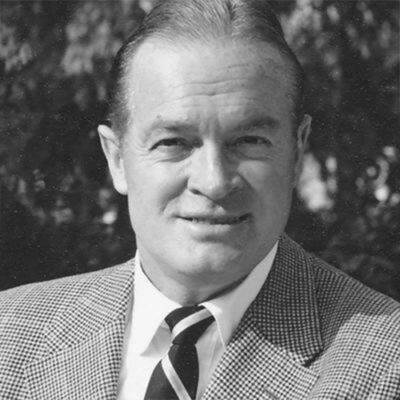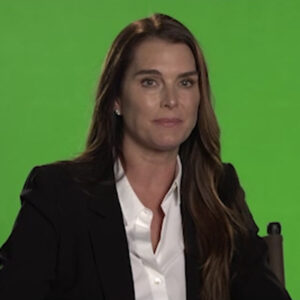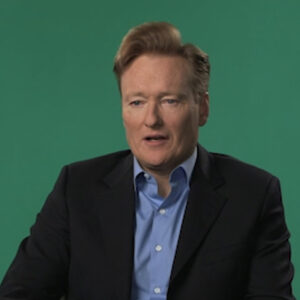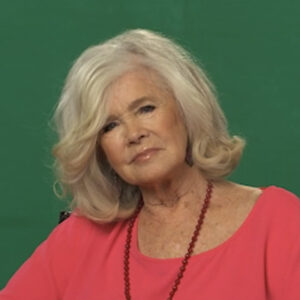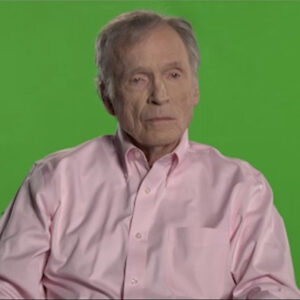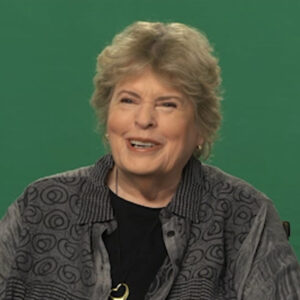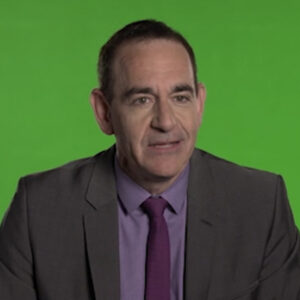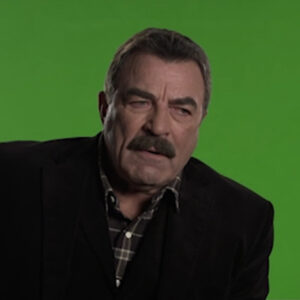Speaker He came out to Hollywood to work for Paramount, and I think roughly at the same time, he auditioned for a radio show of his own and Pepsodent became his sponsor. And he was never afraid of hard work. It’s one of the things that defines him, and when he got onto this radio show, he was not yet a household name. He was an up and comer. He was about to make his debut in the big broadcast of 1938 Big Paramount feature film. And he started working in radio and he hired some good writers. And I suppose the people, the agency he worked for hired good writers for him. But then he decided with his colleagues that they should do a test show first, a run-Through show a couple of nights before the air. And he thought he always believed that’s what made his success, was that they did a run through, tested the jokes, saw which ones clicked with the check them off, which ones got the laughs, which ones didn’t. And so they they honed it and refined it. He also happened to have exceptionally good writers working for him, Panama and Frank Melville Shavelson and Jack Rose, just the first of a long, long line of really top drawer comedy writers. And they all had to audition. They vied with each other for his attention, for his blessing, for his approval of the jokes. Mel Shavelson complained, though, that he didn’t understand that sometimes it was the rhythm and the order of the jokes that made them work. So they checkoff jokes one, three, four and seven. And Bob thought that if he just told one, three, four and seven, they would all get big laughs and that wasn’t always the case. It was the it was the rhythm. It was the momentum that led to them. But he learned fast. He was a quick learner. And as I say, a hard worker never shirked from work, never, ever. And that’s what made his show a success. And and within a very short span of time, he was, you know, kind of an underdog and became the top dog in radio. I mean, no one approached Jack Benny. Jack Benny was on the number one slot. But Bob Hope, who was younger than these other vaudevillians turned radio stars, younger than Fred Allen, younger than Jack Benny, younger than Edwin, younger than Eddie Cantor. He came along and he was kind of this brash breath of fresh air and America took to him.
Speaker Was it just a lot of jokes or was there a format for the show?
Speaker Well, the format for the show is the same format, essentially, that he stuck with for decades to the television era open with a topical monologue, a lot of good, funny rapid fire jokes, the occasional ad lib, a kind of a winking at his audience, letting them in on the fact that, you know, some of the jokes worked and some didn’t, and then sketches a guest star and a skit musical performer. And and then eventually a sign off song, which very quickly became thanks for the memory, which he introduced in the big broadcast of 1938.
Speaker Did he have any regular cast regulars of note?
Speaker He had a series of comic foils and co-stars and regulars on the show over the span of years. One was Jerry Colonna, who had been a trombonist, a studio musician, but who was a naturally funny guy and a funny looking guy, which did no good on radio. But but he became known in his own right. And he worked with Hope for decades. And they were very close, made a lot of overseas tours with him. And I think there was genuine affection between them. There was very vague. This was an actress named Barbara Jo Allen who invented the role of a man, hungry woman who would do anything to snare a guy. And her name was very vague. There were two women who were spoofs of current society women. They were named Brenda and Corvina. Sorry, they were they there were two there were two comic actresses who played the roles of Brenda and calvina named after Society Tot’s of the Day. And they were they were comic foils for a while. He got very smart about hiring people who could work with him and fill more than one role. So when his featured singer was Frances Langford, she also appeared in skits. When his featured vocalist was Doris Day, she also appeared in skits and it turned out that both of those women had a facility. For for timing, and they learned a lot from Bob’s timing, of course, and they became co-stars in a very real sense, and they could do sketches with him and hold their own.
Speaker How how was his show different from most of the other comedy shows on the air at that time?
Speaker I think he was I think he was younger. I’ve used the words before. I think he was younger, Brasher. A little more irreverent. And more definitely topical than most of the other comics, they all made references to things that were happening around them. But over the years, Bob Hope became known for doing that really commentary, but reacting and reflecting on what was happening in the news of the week, as he later famously did right in front of presidents, he mocked and also was friendly with.
Speaker A vast number of American presidents starting with FDR.
Speaker Um, going back to when you were a kid, any hope radio shows you remember? No, unfortunately, no. So let’s talk about oil.
Speaker Even when he had Bill Goodwin as his announcer, Bill Goodman was more than just an announcer. He was also a foil. They could they had repartee back and forth. So he made use of everyone around him on the show to help build the show into the best it could be.
Speaker Let’s talk about topical. When World War Two started, he almost exclusively broadcast from Army bases. Yeah, something like that pretty early on.
Speaker Pretty early on in the World War Two era, after the draft had begun and after there were rumblings and certainly after Pearl Harbor, he started doing.
Speaker Incoming, I hope it’s one of ours, right?
Speaker OK.
Speaker Pretty early on, he discovered the the magic that happened when he performed for soldiers. An army and air force sorry, was an air force, an army and navy bases. Pretty early on in the war years, he discovered that there was a kind of a magic performing for four soldiers and sailors at different bases around the California area, and this is before he went overseas.
Speaker But there was something about him coming along and being irreverent toward their superiors, making jokes about the food on base, the lack of women, any number of things that they would immediately relate to. And he placed himself as one of them because if he was allowed to make the wisecrack and they weren’t.
Speaker That’s what that’s what made the sympatico with him and his audience, he was saying what they were thinking. And it was a great formula that stood him in good stead for decades. Why do you think? Oh, well. He even had fun with his sponsor. He didn’t actually make fun of Pepsodent, nobody would do that, but again, there was a kind of a a cheekiness in the way that he not only referred to a sponsor, but then refer to a sponsor wherever he went.
Speaker If he was a guest on Bing Crosby’s radio show or Jack Benny’s radio show or anybody else’s radio show, he’d always sneak in reference to Pepsodent. Which I’m sure made the pepsin people very happy.
Speaker Back to the second radio.
Speaker Talk to us, maybe some we got something. We’ll be right back.
Speaker With regard to the troops, what do you think? For the audience, what was the impact on morale, the war effort? The fact that he went to all these bases and was in effect, giving the audience a window into where their kids might be or something.
Speaker I think it must have been heartening to a lot of American families to know that Bob Hope was entertaining their sons, brothers, fathers, that they had something to laugh at, they had something to relieve the grimness of the life they were leading, whether they had been overseas yet or not. And and I’m sure it was reassuring. And after a while, it became a constant because Bob Hope became a constant presence in those settings.
Speaker That’s great. Did you say you became top dog, a top dog? Did you stay in the top 10 ratings for his whole radio career or was there some sort of.
Speaker The answer is yes. Isn’t there is not.
Speaker The answer is yes, probably. Yeah. Yeah.
Speaker Once he hit the bull’s eye. On his radio show in nineteen thirty eight, thirty nine, something like that, he remained a top top star. I don’t know the exact ratings, but he but he never rested on his laurels. He never took it for granted, and when he would appear on someone else’s show as a guest star, as he often did, he had his writers provide material. He never took a chance of not being as good as he was on his own show. That’s really interesting to me as well.
Speaker A bid about the writers, was it unique to have that big a writing staff?
Speaker It wasn’t unique to have a lot of writers, but. No other comedian I can think of had so many writers who went on to great careers of their own. That’s unique. I mean, Jack Benny had wonderful, wonderful writers, but and was very loyal to them, and they were to him, but their names are not that well known over the years. The roster of people who work for Bob Hope, who later went on to write and direct their own movies and television shows with great success, I think is unparalleled. Start with Mel Frank and Mel Shavelson and Jack Rose and. How Cantor, Larry Gelbart and just go on and on and on and on.
Speaker Great. Let’s move over to the movies. OK, what can you tell us? We shut the door, was it was it just downstairs, we shut the door. What can you tell us about his early movies in the shorts?
Speaker In the 1930s, Warner Brothers had a studio in Brooklyn called Vitaphone, and they made short subjects, one and two reelers, 10, 20 minutes long, and they took advantage of the fact of being in New York, where they could draw on Broadway talent, top vaudeville stars. They could get them to come out and shoot a short in a day or two or three in Brooklyn, and it wouldn’t interfere with their nighttime performing schedules on the stage. So they had the pick of the crop, you might say, and Bob Hope was one of those performers. They featured him in a series, he’d made a few shorts for random shorts for other people, too, but he signed a contract with with Vitaphone and did a half dozen shorts for them of varying kinds. One one movie musical comedy. The next one might be just a kind of a.
Speaker Flip wisecracking comedy, they teamed up with a comic actor named Johnny Burks for a while and you know, he didn’t have a persona, he didn’t really have an established personality except being kind of young and flippant. That was about it.
Speaker So what was his big film Breakthrough and what made that film so special?
Speaker His breakthrough came when he moved to Hollywood to appear in the big broadcast of 1938 with W.C. Fields, Martha Raye and a number of guest stars and. He was the ostensible leading man of the film Fields carried the comic burden of the film, Bob Hope was pretty much the nominal leading man, and he was teamed with a very. Endearing and engaging singer performer named Shirley Ross, and they got to introduce the song, Thanks for the memory. Which is part son, part spoken and a very poignant song, even melancholy at times. Not what you would associate with Bob Hope, even the young Bob Hope, but it made a big impression and really helped establish him. The next year, he and Shirley Ross were reaching Paramount always knew when they had a good thing. They reteam him and Shirley Ross for for another film and then another film. And they tried to find another song to, you know, to match. Thanks for the memory, which was hard to do. But Frank Loesser wrote a song called The Ladies in Love With You, which was very good. And, you know, they were off to a good start. But as his radio show became more popular, I think Paramount started thinking more and Bob Hope himself started thinking more, that they ought to take that radio personality and transpose it to the movies. And it took several years for this to happen. But by 1940, one. Forty and forty one, they were doing it in films like The Cat sorry, let Mr..
Speaker At a certain point, I think Hope and Paramount both realized that he was developing such a strong and likable personality on the radio, they ought to be exploiting that in the movies. And they started tailoring the movies to that comic persona.
Speaker The the persona of a somewhat. Sorry, one more time, you go in the right place.
Speaker Yeah, that’s great.
Speaker After a year or two, I think Paramount and Bob hope to realize that he was establishing such a successful and likable comedy persona on the radio, they should be exploiting that in the movies. And they started tailoring those movies to that personality.
Speaker So films like The Cat and the Canary and The Ghost Breakers and Caught in the Draft, all these films started building and shaping the Bob Hope character that became a top box office star for the rest of that decade.
Speaker Let’s talk about in some detail what are the qualities of that character on screen.
Speaker He fancies himself a ladies man, though, and while he’s not unattractive to the women who appear in this sorry, he fancies himself a ladies man and he fancies himself a guy with bravado of many sorts.
Speaker And really, he’s a he’s a coward. He’s a coward and a chicken and has nothing to back up that, you know, that that facade that he puts in front. And that’s part of that that’s part of the ongoing gag. They wisely teamed him with a series of beautiful leading actresses, Paulette Goddard, Madeline, Carole, Dorothy Lamour, many, many others, and because he was not a burlesque type comedian. It was credible that he could be seen in the company of those those women, those leading ladies. And that was part of his appeal to he was he was kind of a leading man, leading man and comedian rolled into one. How big a movie star was he in the nineteen forties, he became a major box office movie star. And some people forget that but that. Really, sir, he became a major box office star and his movies were very, very popular.
Speaker People sometimes forget that. They also forget how funny those movies were. He often hired his radio writers to come and punch up the scripts. And one of the writers later said it was Naft need a few things. That Bob would call for any number of occasions, whether he was making a speech for a charity or needed a script, punching up or a scene was a little flat, in his opinion, and that’s what he did. He also turned out to be surprisingly good physical comic. Now, here’s something he had no experience at particularly, but he was able to do all sorts of gags and didn’t shy away from doing slapstick and broad humor on screen. And if the situation was credible or even reasonably credible, they could pull it off and so could he.
Speaker Did he actually ad lib in the movies or was he just so good he made it seem like he was adamant?
Speaker I think the art of what? Well, that’s really Crosby territory. So we should we should go go to him.
Speaker Yeah. Talk about his sense of comic timing.
Speaker I think working well, working in vaudeville, working all those years in front of a live audience where you lived or died, there was no filter either. The audience responded or they didn’t. I think it taught him an awful lot.
Speaker His first two memoir books are full of vaudeville stories and experiences, and they give you an idea of his training, of his baptism of fire, you might say, and that gave him a tremendous grounding. And then when he was doing the weekly radio show, doing a rehearsal version of the show, a run through, you might say, an East Coast version of the show, a West Coast version of the show. Well, who who wouldn’t learn from that unless your eyes and ears were plugged up? He he had a great sense of timing and it just got better and better because of that audience response.
Speaker That’s great. So talk a bit to tell us how he came to be paired with paying for the road pictures. Talk a little bit about the first movie or two.
Speaker He and Bing Crosby knew each other and they had appeared together years earlier on the same bill on a stage show in New York, and they found that they they had an easy kind of repartee and they enjoyed fooling with each other and, you know, sort of poking fun at each other a little bit.
Speaker And when they both. Well, when Bob moved out here. He moved where Ben was living, Coldwater Canyon, at first, but no, sorry, I got that wrong. I got the wrong sorry scripts it right. When he moved out to California, when he moved out to Los Angeles, he and Dolores originally lived a cold water canyon. But then they were visiting the Crosby’s in Toluca Lake and they said, oh, this is nice. So they rented a house at first in Toluca Lake and then bought their own. So that’s that’s how, you know, he he and Bob were at hard.
Speaker So again. Yeah, OK. Where can I pick it up? Yeah, so let’s forget the house. Yeah, I think just sort of picked up the camaraderie reporting.
Speaker Working together just a couple of times, they developed this kind of very easy rapport, this repartee where they would kind of poke fun at each other, surprise each other with gags and audiences liked it and they liked the two.
Speaker They enjoyed doing it. So when they were both under contract to Paramount, I think it was just pretty much coincidence that they were team together in the road to Zanzibar. Just, you know, the script was written for a duo. And they were the duo. A Bing Crosby was a huge, huge star at that time in every conceivable medium of show business, Bob Hope was still sort of the junior partner there, but he was at that moment red hot. So Bing didn’t treat him like a junior partner. They came in as equals. And and Bing was a pretty, pretty funny performer himself. That’s not what he’s remembered for. But he had a great way with comedy. So the two of them enjoyed working together and started hatching little ideas and plan to ad libs, you might call them, and doing things that caught the director off base. And and the directors of these early films, Victor Scherzinger, David Butler, they quickly learned, let them do it. Don’t stop that. Don’t suppress that. Let them do it. And over the course of those films, each one got better. Each road film topped the previous one because they worked hard. Again, they weren’t afraid of hard work, but the art was making it look easy, making it look spontaneous and natural. Bob and Bing both had writers working for them besides the credited screenwriters on the film, and they sometimes deliberately sprang things on each other while the cameras were rolling. So those aren’t exactly ad libs. They were just unprepared for each other’s jokes. In a few cases, everyone likes to envision that it was all improv and it was all, you know, spontaneous. It wasn’t, but it looks spontaneous. And the magic of those road movies is that they let the audience in on the jokes. They broke that fourth wall. They. Talk to the audience sometimes not just winked at the audience, they actually address the audience. And everyone in the audience had a feeling that they were they were sort of they were privy to this private little gag fest between Bob and being.
Speaker And that was very appealing, very, very appealing, we think now of those films as classics, were they then were they successful right out of the box or did they?
Speaker The first one was a hit. That’s why there was a second and a third and the fourth and fifth because they were so successful, so successful, and they they played into the existing personas that both Crosby and Hope had at that time. Crosby was the ostensible romantic leading man. He was never comfortable really doing love scenes, and he tried to avoid them in his movies. And even the songs that they wrote for these movies in particular are always in direct love songs. Moonlight becomes you that that doesn’t say I love you. It just says you look lovely in the moonlight. And I find that nice. So those are the kind of songs they wrote for for being Bob was the would be leading man.
Speaker And was smart enough to let the joke be on him. He and Crosby are always romantic rivals in these films. Well, somebody with a more fragile ego might have said, no, I don’t want to be the one who loses the girl. He made a joke out of it. He made it part of the road picture formula, if you will. And Bob never got the girl. And he made that a comic staple smart enough to recognize how effective that was.
Speaker What’s your favorite picture? I think my favorite is Road to Utopia. It just has so many funny, wonderful gags, unexpected things, as Robert Benchley commenting on the action, it has that wonderful song, put it there, pal, a great team song. I mean, the ultimate song is we’re on we’re off on the road to Morocco. But but I would like put it there, pal, to.
Speaker That’s great, um, I kept doing the road pictures, did sort of the initial run to forty seven or whatever it was, and they came back one more time and then you. Yeah. More time to write a little bit about what happened to the series with those last two pictures.
Speaker By the time they made wrote to Balli in the early 1950s, they’d been doing these films for more than a decade, but they were still fresh and funny. This was the first one in color. And it’s a it’s a very good film, it’s got some great, great gags, some unexpected cameo appearances, a lot of laughs and at the time. There was a scene where they did a lot of sand for one scene, and Paramount hauled a bunch of white sand, perfect white sand onto the soundstage, and when they were done shooting, they had to haul it all away. And Bob noticed this one day and he said, hey, wait a minute, I own a third of that sand. Because by this time, there were such big stars, Crosby and Hope and Paramount jointly produced the picture together, and he called Bing and said, that’s our sound.
Speaker At least two thirds of it is. And Bob had it deposited at his home where he had to whole golf course.
Speaker Now, the last picture. They remain stars mostly. Kept.
Speaker They kept making movies all through the 50s and well into the 1960s, although by that time television was the dominant medium and while neither one averaged the weekly series, they did a very popular series of specials and often guested on each other’s shows. I don’t know who suggested that they revisit the road pictures, but somebody came up with the idea and they made the road to Hong Kong, which is again a pretty funny movie, and they made it in England and got a great cameo from Peter Sellers, who is just uproariously funny in it and. Apparently was on that trip that the Crosby’s in the hopes being having remarried and started a new family with Kathryn Crosby, the hopes and Crosby actually became closer than they’d ever been before. From being on on that location away from home for a while. And it’s a pretty good picture.
Speaker I’m going to. Mentioned some movies, just kind of give me your Quick Hits on. Caught in the draft.
Speaker Calling the draft couldn’t have been more topical, it came out the same year that and Costello made Buck privates. I mean, you know, American life had changed with the imposition of the draft. This is before Pearl Harbor, before we were actually involved or engaged in World War Two. But it was a preparatory move on the part of the United States. So making a military comedy was about as topical as you could get. In inserting the Bob Hope persona, yes, and it’s very much the movie Bob Hope inserted into that setting. Louisiana Purchase, Louisiana Purchase is a musical comedy, was a Broadway show, it was filmed in Technicolor. It’s not typical Bob Hope fodder, and it’s the last time for a long time that he made a film like that, something that was really not a vehicle, not just a Bob Hope vehicle. Star-Spangled Rhythm. Star-Spangled Rhythm is one of the. Handful of films that the studios made during the war. As a morale boosting effort, but while there were also morale boosting efforts, they were ways of showing off their roster of contract stars. So Paramount made star spangled rhythm as well as several others, and got to use Bob and Bing and even involve the writer director Preston Sturges, who is the hottest thing on the lot at that time. My favorite blonde. My favorite blonde is a great spy comedy in which Bob gets to play a leading man with the beautiful Madeline Carol, it’s one of my favorite films of his life. I think the framework of a spy comedy suits that character of his really well, really, really well.
Speaker That’s great, Princess Environ. Been too long.
Speaker OK, Mr. Beaucaire, we see a book here is often cited, Woody Allen often cites Mr. Beaucaire as his favorite Bob Hope picture, and it’s one that he refers to more than once, certainly in love and death. He’s thinking of that. And even in everything you always want to know about sex, he’s thinking of that, especially when he’s playing the jester who is absolutely Bob Hope. Mr. Beaucaire is is a wonderful film because it takes a the framework or foundation of a costume picture which have been made in the 20s with Rudolph Valentino. It’s based on a novel. I mean, it has a pedigree. But then they layer Bob Hope’s comedy on top of that and his familiar persona on top of that, and it’s a perfect match.
Speaker That’s great. My favorite brunette.
Speaker My favorite brunette is I don’t know what to say about it.
Speaker OK, that’s right. Phil Jones. OK, paleface.
Speaker Paleface was the first of his Western comedies, and they’re certain surefire things, and if you poke fun of the genre and do it well. Your book here was a comedy take on a costume picture, a period picture Will Paramount had the wherewithal to make a really good looking period picture that also happened to be a comedy. And the same is true with The Pale Face, which was written by the great Frank Taslim. A Tasseled didn’t like the way Norman McCleod directed it. And that’s why he said he finally turned to directing himself and he directed his own script of Son of Paleface, which in some ways is even better than the first.
Speaker Talk about how they spoof the Western. How well they did it, in your estimation.
Speaker Well, again, the idea of in those days, Westerns were pretty formulaic and those days Westerns followed a pretty regular formula. There were exceptions to the rule. But the good guy in the white hat, the bad guy in the black hat, the inevitable shootout, the dance hall, you know, all of these things were things that people were so accustomed to. Westerns were such a huge part of the moviegoing landscape at that time. So it didn’t take a lot of genius to figure out. That people would recognize those things and laugh at a good parody. And that’s what Hope gave them. He also gave them an Oscar winning song, buttons and both.
Speaker Grade seven, little force.
Speaker By the 1950s. Bob and Paramount were looking for something different for him to do. He couldn’t pretend to be a 25 year old anymore, and he I don’t know how much he wanted to stretch himself, but he was willing, willing to be talked into doing. Other types of things than his routine formula comedies, The Seven Little Boys is one of the most successful of these. And I think he must have felt at home because it’s about vaudeville, which is something he knew inside and out, and it allowed him to show the full range of his talents because that tap dance routine he does with Jimmy Cagney is just sensational. And people forget what a good huffer he was.
Speaker That’s great, um, obviously, as you said, he was a great comic star, was he a good actor? And can you point to a particular movie or character he played that showed off his acting chops?
Speaker When he wanted to be. He could be a good actor. He proved it in Seven Little Foys, he proved it in both games, he proved it over and over and the Facts of Life, a dramedy today, we’d call that with Lucille Ball. The problem was that he. He didn’t always want to take that chance. He wasn’t always to take the promise, he didn’t always want to take a chance and put himself out on a limb or take that risk. He’d want to give himself some insurance, some comedy insurance to back it up. But but he was good.
Speaker That’s great, um.
Speaker What does this say about Bob Hope that he was selected to host the Oscars 14 times?
Speaker I think he was the ideal Oscar host because first off, he was part of Hollywood. He was in the movies, part of the Hollywood community. He already had a reputation for being flippant, so nobody was surprised when that he took that pose even at the prestigious Academy Awards. And and, of course, he also used it as comic fodder that he never won an Oscar. And that was a joke he extended for decades with great success. And the fact that he was willing to make himself the butt of that joke was very appealing both to the industry people there, and I’m sure that the people at home listening.
Speaker Was he some people still think of him as the best Oscar host ever. Would you go that far?
Speaker I’m one of those people who thinks he was still the best Oscar host. There have been other very good ones, but I still think he holds the crown.
Speaker Great, um, talk about when and why his career as a movie star started to decline.
Speaker His movie career started to peter out a bit in the 60s because. Movies were no longer the main driving force of his career, television was and personal appearances. You continue to tour, you know, appearing in theaters around the country and sometimes overseas as well, and he enjoyed that. But movies became secondary, and what’s more, there was no longer the machine behind those movies. There was no longer a studio like Paramount constantly supplying him with material, finding new script ideas, having staff, producers who could develop scripts. He had to do it on a. By that time, he had to do it all himself. Now, he wanted to be his own producer. That part we understand everybody was doing that then. But it meant he had to generate the material and had to be his own best judge and Ed. And there was no one kind of to look over his shoulder and say. Maybe we can do better. But I admire the fact, though, that he tried different things like the facts of life and critic’s choice with Lucille Ball. There was an opportunity for both of them to do something more serious. To play opposite each other in a serious vein, not without humor, but they were not really comedies, per say, and they both broke with their standard roles that people expected them to be and that show some daring on their part.
Speaker Some writers have talked about that he began to lose touch with his audience. Is that something you’d agree with?
Speaker In the 60s, yeah.
Speaker I don’t think you lost touch with the audience in the 1960s, and it shows in his great monologues. From the specials that he did all through that decade and the fact that he’s still connected with so many of the soldiers and sailors and Marines that he performed for overseas, it’s toward the end of the 60s as we get toward the the social revolution. And the use the fine of the armed forces that things begin to change. And the movies, I think the harshest word I could use is lazy. I think he got a little lazy. I think he accepted material that wasn’t worthy of him. And gave the OK to make those films when he should have been holding out for something better or insisting on something better.
Speaker Is there any moment, you know, of where somebody offered him? A great picture that he turned down.
Speaker No, I don’t actually.
Speaker Good, um.
Speaker In the comic pantheon of movie stars, where would you put Bob?
Speaker I think Bob Hope is is one of the great comedy stars of movie history. He’s not like anybody else, really. He’s not like W.C. Fields, he’s not like. Danny Kaye is not like Red Skelton. He’s not like Jerry Lewis. He worked with many of those people and, you know, sometimes sometimes, uh, sir. To me, the great comedy stars in movie history are unique, each one is unique. There’s only one W.C. Fields. There’s only one. Jerry Lewis. There’s only one Bob Hope, nobody ever did exactly what he did, the way he did it as well as he did. Not like anyone else.
Speaker That’s great. Do you see Bob Hope in any contemporary performers on the big screen?
Speaker Bob Hope was of the generation that came through vaudeville at a time when in order to succeed, you had to be versatile, you had to be able to do a little of everything. And indeed, he could sing, he could dance, he could be comedic and he could act. All of those things, and it wasn’t true just of him, was true almost everyone who came through that period and went through those years of struggle. In order to succeed, you have to be flexible, you might have to change your act next week if you want to get rehired, you might have to come up with a new act. You might be teamed with somebody else. And all the people who who experienced that came away. Complete in quotes, complete performers, he was one of those people.
Speaker Great. Um, I’d love it if we could get. We talked about a little bit before the sound bite where you can talk about how he mastered every form of mass entertainment and became a. Something that can wrap all that together.
Speaker Here was a man who succeeded in every conceivable form of entertainment. The obvious ones, movies, radio, television, the stage, but add to that recording’s. Books, he had best selling books. And that’s before anyone else was doing that kind of thing. Well.
Speaker Oh, I’m sorry I got lost. That’s OK. Well, we take it again.
Speaker Yeah, if you could mention Broadway, here’s a man who succeeded in virtually every form of entertainment we know of. Vaudeville, Broadway, movies, radio, television, he even had some hit records, certainly some very entertaining records. He was the author of best selling books. I mean, some of those were ghostwritten in part by his writers, but his his personality is there is part of that, especially the early ones with his accounts of his early years and his time in vaudeville. Those are wonderful books. He wrote a column, a newspaper column for a while in the 1940s about his travel experiences overseas. There’s nothing he didn’t or couldn’t do. No wonder he was kind of known as kind of the king of show business. He was.
Speaker That’s great, um, today, why does Bob hope matter?
Speaker I think Bob Hope matters if you enjoy comedy. Was he some funny movies watch some of those films he made in the 40s, especially watch the road pictures. Watch paleface and son of paleface. Watch my favorite blog or my favorite Brunete. Or the great lover.
Speaker Watch him dance with Jimmy Cagney if you want to put a big smile on your face and the Seven Little Foys.
Speaker Great entertainment. Is timeless, is ageless. That matters.
Speaker That’s great. It strikes me in some ways, he’s the quintessential American dream success story, immigrant comes here such and such a. Would you look at that and say, yes, that’s what he was, the real American?
Speaker Well, he was the American success story born in England, comes here with nothing really makes a success. He is the quintessential American success story. He comes here from England.
Speaker Without any particular. Foot in the door of any business. All right.
Speaker He is the quintessential American success story. He was born in England, he came here and earned his success.
Speaker Nobody handed him anything. He did it he did it through hard work and persistence and talent. And became not only a wealthy man. But a household name. A beloved figure in show business and a success in every form of show business, but how could you do better?
Speaker Let me just go, guys, any questions? Did Bob Hope’s the Bob Hope specials make a real mark on American television? That’s a good let’s do that.
Speaker He decided not to. He had done a weekly radio show for more than sorry. He did a weekly radio show for years and years and years, they used to take summers off, but they did very full seasons in those days. And when TV came along, he decided he did not want to become. A weekly television star. You a radio is a much easier medium, you didn’t have to do anything visually, you have to put on a makeup or costume or build sets. TV involves a lot of work. And he wasn’t afraid of hard work, but he was afraid of perhaps overexposing himself and he was still maintaining an active movie career. It would have been a little much. So instead, he did a continuing series of specials for 50 years or more. And they became part of the television. Landscape, it was just something you always knew was coming up the next Bob Hope special.
Speaker What was the joke you told me?
Speaker When I moved here in the early 80s, when I moved to L.A. in the early 80s, there’s always consciousness of earthquakes.
Speaker Somebody said to me, what does the big one and the next Bob Hope special have in common? I said, what is it said? You know, they’re coming and you can’t do a damn thing about it.
Speaker Something nobody miss.
Speaker Yeah, and and to the very end, his monologues remained sharp and topical and funny. The Skitz, not so much, but those monologues, and he preceded Johnny Carson, he preceded Jay Leno, he preceded the kind of people we think of as doing that kind of daily topical humor. If you want to bring it up to Jon Stewart and, you know, Stephen Colbert and people like that, everyone we think of today who does that on a nightly or weekly basis owes some debt to Bob Hope.
Speaker Did using the cue cards get in the way of the comedy for you on those some of those TV specials?
Speaker Only I only became a cue cards in later years. When he was older and not quite as sharp. And in his late years, he was deaf as a post and refused to wear hearing aids, but I. I had lived with my mother in law who had severe hearing loss and I knew how to talk to someone like that, and I interviewed him in later years and he was great.
Speaker And he always gave me great answers because I spoke loudly and clearly toward his ear.
Speaker He still have it and the other thing that struck me about him in later years when I would see him casually or I saw him at a charity event or something, is he really loved telling jokes.
Speaker You could tell he enjoyed it.
Speaker Last question, because we’ve got to get you out of here, um. What’s your perspective on hope and the troops in the Vietnam era? Both for what it did for them and how the homefront responded.
Speaker There’s been some criticism of him. In the Vietnam era, still hewing to his same format formula and entertaining the troops, and it’s been said that perhaps the younger troops didn’t know that much who he was or care. I don’t know how true that is. I remember watching those shows when they were new, it seemed to me that they were being very much entertained, not just by him, but he always had glamorous women with him. And he and he still made himself the butt of jokes and he still used the the can’t miss formula of making fun of the top brass and of some of the some of the deprivations they had to live through and and as if he was one of them. Now, of course, he was much older than them by that time, but I think those jokes still played.
Speaker Some people thought he exploited.
Speaker The the war that he would gladly have started a war in order to entertain somewhere on the globe, but those specials were enormously popular.
Speaker And.
Speaker You know, people say he profited from them. He’s entitled to get paid, is a paid entertainer. I don’t see anything immoral or unethical about that.

